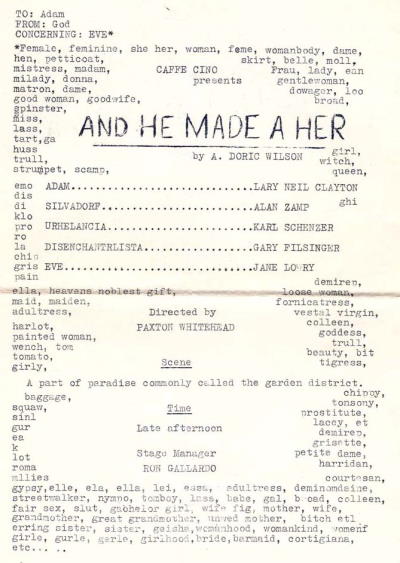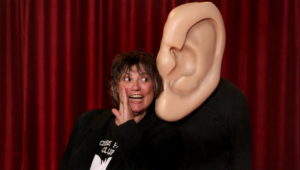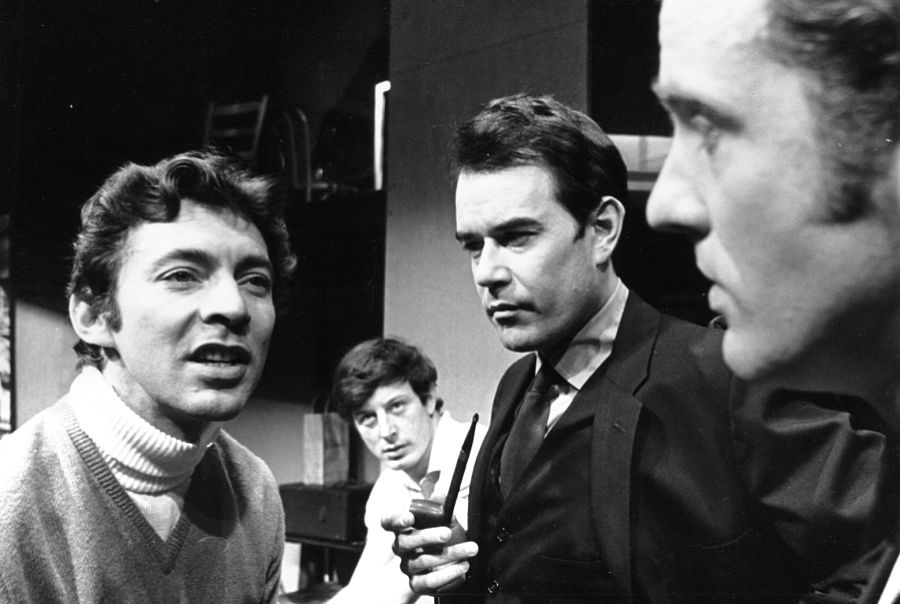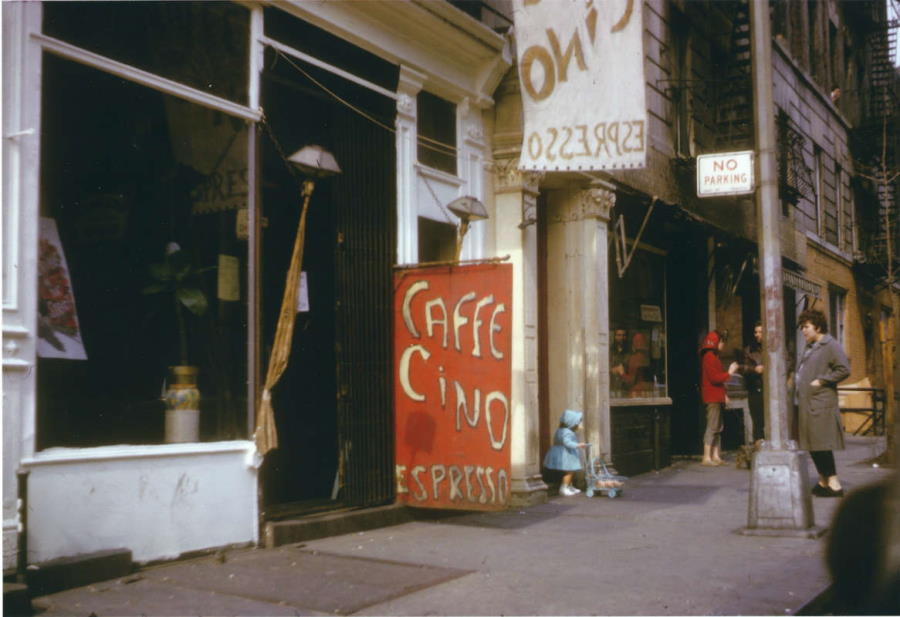June 1961 (60 years ago)

Babel, Babel, Little Tower opens at Caffe Cino this month, the second of four plays by Doris Wilson produced at the seminal Off-Off-Broadway venue in this banner year, all featuring openly gay characters. (The others were And He Made a Her, Now She Dances, and Pretty People.) Run by Joe Cino, Caffe Cino was a West Village coffeehouse that hosted play readings and performances, and is now considered the birthplace of Off-Off-Broadway. Doric Wilson, a queer activist and writer, later went on to co-found a gay theatre company called The Other Side of Silence, or TOSOS, in 1974. In June of 2001, Wilson worked with directors Mark Finley and Barry Childs to resurrect TOSOS as an organization “dedicated to an honest and open exploration of the life experience and cultural sensibilities of the LGBTA+ community and to preserving and promoting our literary past in a determined effort to keep our theatrical heritage alive.”
June 1981 (40 years ago)
This month San Francisco’s Theatre Rhinoceros produced playwright Arch Brown’s play News Boy, which got a mixed review from Bay Area Reporter critic John F. Karr, though he concluded, “News Boy reflects our lives continually and perceptively enough to be rewarding…Every man on the stage is me at one point or another; I am each of them. The perspectives this affords into other people’s lives, and our own, is richly rewarding, strongly comforting, and, well yes, entertaining.” Theatre Rhino, which claims the mantle of “the world’s longest-running continuously producing professional queer theatre,” was founded in August 1977 by Allan B. Estes Jr., and has for 44 years produced, developed, and presented dozens of queer playwrights and theatre artists, including Marga Gomez, Terrence McNally, Harvey Fierstein, Jane Chambers, Kate Bornstein, Peggy Shaw, Erika Lopez, and Sara Moore.
June 1986 (35 years ago)

Performance artist Terry Galloway, author of the memoir Mean Little Deaf Queer, garners a West Coast production of her one-woman play Heart of a Dog, with Debbie Devine starring and Ivan Spiegel directing (Galloway herself had played the autobiographical role in the show’s New York premiere). Galloway is a founder of the long-running Tallahassee, Fla.-based Mickee Faust Club, a performance company and venue that serves those that are “not just underserved but overlooked.” Mickee Faust prefers to tout its Faust Manifesto, but its obligatory nonprofit mission statement expresses well that the artistic creators are “people from the LGBTQ+ community, people with disabilities and people from the lower-income strata.”
June 1991 (30 years ago)
This month the PostModern African American Homosexuals, a.k.a. Pomo Afro Homos, opened Fierce Love: Stories From Black Gay Life at Highways Performance Space in Santa Monica, Calif. Eric Gupton, Brian Freeman, and Djola Branner, the original trio of performers, had formed the group a year earlier. In this first performance piece, which they toured nationally and internationally, the group explored their Black queer identities through a series of 12 vignettes. That same summer, their performance Fierce Love was banned from the National Black Theatre Festival in Winston-Salem, N.C., for its explicit queer content. But they were welcomed with open arms by many other communities and festivals, where the final vignette, “Toward a Black Queer Rhythm Nation,” was an audience favorite.
June 1996 (25 years ago)
This month playwright Mart Crowley sat in the opening-night audience of WPA Theatre’s revival of The Boys in the Band. The groundbreaking play had originally opened Off-Broadway at Theatre Four in 1968—a time when Crowley remembers it was “nearly impossible to find” actors willing to play gay characters. Crowley said he wrote the play partly as a response to the challenge laid out by New York Times drama critic Stanley Kauffmann in his 1966 essay, “Homosexual Drama and Its Disguises.” The essay argued for “gay playwrights to ditch all the hinting and coding and veiled metaphor so as to honestly and openly depict the lives of homosexuals.” Crowley did just that, writing a play about eight men who gather to celebrate a birthday in New York City. Some critics have cited the play as having influenced attitudes that led to the Stonewall Rebellion. Since this first revival, The Boys in the Band has had a London premiere (2016) and a Broadway revival (2018). The play has also been adapted to film twice: first in 1970, directed by William Freidkin, and most recently in 2020, directed by Joe Mantello and available now on Netflix.

Also this month, NYC performance venue Dixon Place hosted a fundraiser for New York Theatre Workshop that took of the form of a plethora of queer playwrights and performance artists doing a staged reading of the screenplay Stage Door, adapted from the play by George S. Kaufman and Edna Ferber. The cast for that one time performance included Tony Kushner, Peggy Shaw, Everett Quinton, Lola Pashalinski, the Five Lesbian Brothers, and Holly Hughes.
June 2001 (20 years ago)
This month Boston’s The Theatre Offensive opened Kate Bornstein’s play Two Tall Blondes in Love” at the Black Box Theater in Boston Center for the Arts. Bornstein is the trailblazing author of Gender Outlaw: On Men, Women, and the Rest of Us. Among the performance pieces they created are Kate Bornstein Is a Queer and Pleasant Danger, The Opposite Sex Is Neither, and Hidden: A Gender. The Theatre Offensive (TTO) emerged out of the “gay men’s guerrilla theatre troupe, United Fruit Company,” formed by Abe Rybeck and a group artists/activists in Boston in 1989. It still thrives today with a mission “to present liberating art by, for, and about queer and trans people of color that transcends artistic boundaries, celebrates cultural abundance, and dismantles oppression.”
June 2016 (5 years ago)
This month Lincoln Center’s LCT3 Off-Broadway series opened War by playwright Branden Jacobs-Jenkins at the Claire Tow Theater. That same year, Jacobs-Jenkins became a Creative Capital grantee with collaborator Carmelita Tropicana for their Jacobs-Jenkins/Tropicana Project. The ongoing project is a performance art piece exploring the similarities and differences in their experiences as queer artists of color whose work revolves around “identity, belonging, and the nature of history and storytelling.”


